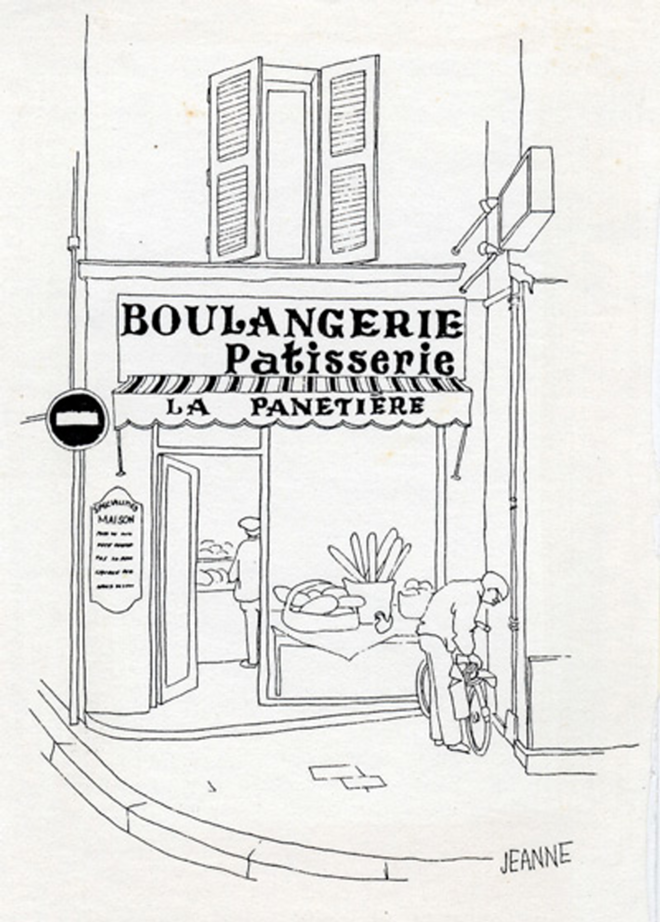Mock on, Mock on Voltaire, Rousseau:
Mock on, Mock on: 'tis all in vain!
You throw the sand against the wind,
And the wind blows it back again.
—William Blake (1757-1827)
William Blake wasn't keen on the French — like many of our presidential candidates, he thought them too rational and atheistic. I thought of Blake because an old friend of mine — an ex-Marine — asked me why I loved France, an ungrateful country that owes us big from World War II but won't support us in our war with Iraq. George Bush, our outgoing nucular president, mocked a reporter who spoke French.
At first, my own interest in France was impurely literary. Many of my favorite writers — F. Scott Fitzgerald, Ford Madox Ford, Kay Boyle, John Dos Passos and Ernest Hemingway — had lived in Paris after World War I, as part of what Gertrude Stein called "the lost generation." A good, middle-class American boy, I yearned to be lost, too, attracted by the Bohemian life, the mix of artists, sexual freedom, cheap, good food and an atmosphere of tolerance. Although I had scarcely misbehaved at all, at an early age I planned on doing so and thought rational tolerance a good idea.
A friend and I finally arrived in Paris in 1955. It was so cheap to live there, we felt like kings with our soldiers' salaries of $98 a month. We sat on the steps of Montmartre at midnight with a bottle of wine, a baguette and a smelly parcel of camembert cheese, the white dome of Sacré Coeur outlined in the sky above us. We finished it all and headed off for Les Halles, the old all-night market. At 4 a.m. we wound up in a dark candlelit bistro, none too clean, eating onion soup while trucks loaded with produce and flowers rumbled and unloaded outside. We looked at each other and smiled: We're in Paris ...
In the years following, my wife and I often lived there with our children. It's still a wonderful country to visit, though not cheap anymore. But by now our admiration has become more philosophical.
One thing I like about France is that its governments have concentrated on making a better life for its less privileged classes. A country should be judged not by how it rewards the rich — already richly rewarded — but by how it treats its poor. Paris doesn't have the slums you find in our large cities; I've been lost there during the dark hours, and it's not nearly as scary as being lost in many American towns. "This is no place to be on foot" was a recent headline in the St. Petersburg Times. And despite some progress, Tampa was recently listed last for "walkability" in a survey of similar-sized cities.
France, bien sur, isn't perfect and is struggling to handle the surge of unemployed immigrants from North Africa in its banlieues (suburbs). Serious riots have erupted — one last December, sparked by two teenagers on a stolen minibike killed when they crashed into a police car — eerily similar to the TyRon Lewis riots in St. Petersburg. (A French joke is that un jeune, meaning "young person," now means "urban teenager with a can of petrol.")
In addition, they seem to be developing some copycat tendencies, with a young trader, Jerome Kerviel, "losing" an Enron-sized $7-billion of his bank's money; and their new leader, Nicolas Sarkozy, behaving like Rudy Giuliani with his latest scandalous marriage.
But Republicans here favor tax breaks for the rich and, to balance that, a stingy minimum wage for the poor. France often bends too far the other way, which is both kinder and more practical. Their 35-hour week may have been a mistake (Sarkozy ran on the platform, "Working more to earn more"), but it's a mistake whose heart is in the right place. In America, Merrill Lynch just fired its boss, Stanley O'Neal, for botching the subprime mess — and gave him $161 million! We justify this kind of inflated pay by contorted defenses of capitalistic individualism — but it still smells: The gulf between our rich and poor is far more dangerous than the conflicts we've been wasting our resources on. Each year more Americans are murdered in our own cities than in the whole Iraq war.
But we don't think, "Zut alors, let's move to Paris!" Mostly, we think, "Why can't we fix our problems? We're the richest country in the world." Although Blake distrusted science, he would have agreed with another visionary, Albert Einstein, who famously said, "Unthinking respect for authority is the greatest enemy of truth." As a country, we need the guts and intelligence to speak up about our misleaders and vote them out. The primaries, with their puffs of change, are a good sign. Last month, conservative pundit David Brooks wrote, "A conservatism that pays attention to people making less than $50,000 a year is the only conservatism worth defending."
What I love best about America is our freedom and generosity. These have made us strong (of course, a little luck and larceny, like the Louisiana Purchase and the Mexican War, didn't hurt). Freedom and generosity aren't givens; they have to be earned and nurtured. When France advised us against attacking Iraq, it was being a good friend, giving us sound advice. If we need to look to France for occasional guidance, well — c'est la vie.
Peter Meinke's latest books are Unheard Music (stories) and The Contracted World (poems).


